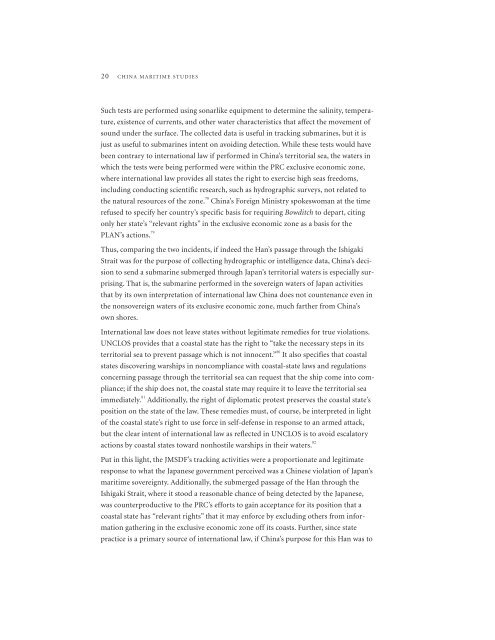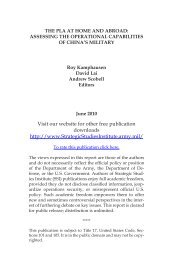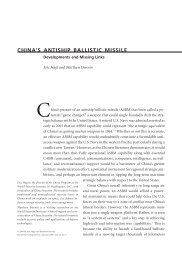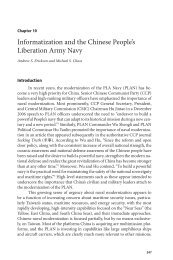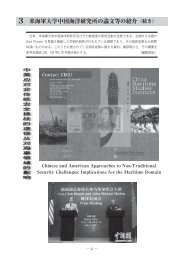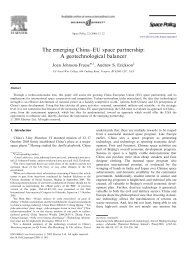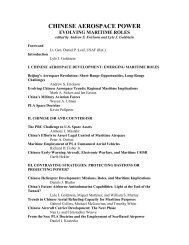Scouting, Signaling, and Gatekeeping - US Naval War College
Scouting, Signaling, and Gatekeeping - US Naval War College
Scouting, Signaling, and Gatekeeping - US Naval War College
You also want an ePaper? Increase the reach of your titles
YUMPU automatically turns print PDFs into web optimized ePapers that Google loves.
20 CHINA MARITIME STUDIES<br />
Such tests are performed using sonarlike equipment to determine the salinity, tempera-<br />
ture, existence of currents, <strong>and</strong> other water characteristics that affect the movement of<br />
sound under the surface. The collected data is useful in tracking submarines, but it is<br />
just as useful to submarines intent on avoiding detection. While these tests would have<br />
been contrary to international law if performed in China’s territorial sea, the waters in<br />
which the tests were being performed were within the PRC exclusive economic zone,<br />
where international law provides all states the right to exercise high seas freedoms,<br />
including conducting scientific research, such as hydrographic surveys, not related to<br />
the natural resources of the zone. 78<br />
China’s Foreign Ministry spokeswoman at the time<br />
refused to specify her country’s specific basis for requiring Bowditch to depart, citing<br />
only her state’s “relevant rights” in the exclusive economic zone as a basis for the<br />
PLAN’s actions. 79<br />
Thus, comparing the two incidents, if indeed the Han’s passage through the Ishigaki<br />
Strait was for the purpose of collecting hydrographic or intelligence data, China’s decision<br />
to send a submarine submerged through Japan’s territorial waters is especially surprising.<br />
That is, the submarine performed in the sovereign waters of Japan activities<br />
that by its own interpretation of international law China does not countenance even in<br />
the nonsovereign waters of its exclusive economic zone, much farther from China’s<br />
own shores.<br />
International law does not leave states without legitimate remedies for true violations.<br />
UNCLOS provides that a coastal state has the right to “take the necessary steps in its<br />
territorial sea to prevent passage which is not innocent.” 80<br />
It also specifies that coastal<br />
states discovering warships in noncompliance with coastal-state laws <strong>and</strong> regulations<br />
concerning passage through the territorial sea can request that the ship come into compliance;<br />
if the ship does not, the coastal state may require it to leave the territorial sea<br />
immediately. 81<br />
Additionally, the right of diplomatic protest preserves the coastal state’s<br />
position on the state of the law. These remedies must, of course, be interpreted in light<br />
of the coastal state’s right to use force in self-defense in response to an armed attack,<br />
but the clear intent of international law as reflected in UNCLOS is to avoid escalatory<br />
actions by coastal states toward nonhostile warships in their waters. 82<br />
Put in this light, the JMSDF’s tracking activities were a proportionate <strong>and</strong> legitimate<br />
response to what the Japanese government perceived was a Chinese violation of Japan’s<br />
maritime sovereignty. Additionally, the submerged passage of the Han through the<br />
Ishigaki Strait, where it stood a reasonable chance of being detected by the Japanese,<br />
was counterproductive to the PRC’s efforts to gain acceptance for its position that a<br />
coastal state has “relevant rights” that it may enforce by excluding others from information<br />
gathering in the exclusive economic zone off its coasts. Further, since state<br />
practice is a primary source of international law, if China’s purpose for this Han was to


